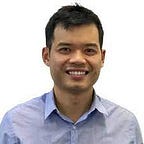Why I chose to learn Software Engineering?
As a child, I have always had a strong interest in emerging technologies and innovation, in particular, being excited about the potential of personal computers. The first programming language I self-taught myself was QBasic, as part of Microsoft DOS on an Intel 286 bulky laptop my father brought home from his workplace.
During high school, I self-taught myself how to program using Qbasic to make simple games (as well as editing the source code for “Nibbles” and “Gorilla”) and algorithms to help me with school work.
As a VCE graduate, I was shortlisted for entrance into medical school at various universities outside of Melbourne, Australia. Being a young man who preferred to stay with my parents with enjoying all the luxuries, I opted out of studying medicine interstate and instead, chose to study physiotherapy at the University of Melbourne. I immensely enjoyed studying physiotherapy and as a new graduate, went straight into private practice for flexibility and autonomy.
My interest in primary care and musculoskeletal medicine led me to startup a solo physiotherapy practice within a local GP clinic as a new graduate.
At the time, faxes were commonly used to communicate between GPs and other health professionals, Medicare payment processing was conducted manually with an imprinter, and physiotherapists were using pen and paper to record clinical notes and prescribe stick figure home exercise programs for their patients.
As a result of these frustrations, I partnered up with my high school mate who was a computer programmer and we built and pioneered the world’s first web browser practice management software for allied health professionals.
Key features included digital clinical note taking, appointment bookings and payments. We leveraged this platform to build a statewide network of allied health services within GP clinics and closed deals with Healthscope Limited and Medi7 Group of Medical Centres.
Since then, I have owned my own sports & musculoskeletal physiotherapy practice, and and treated over 25,000 patients. In addition, I have successfully established a number of health tech related startups, consulted and advised for healthcare peak bodies, healthcare businesses and health IT corporations.
From grass root experiences of applying technology in primary care, I came to the recent self-realisation that I had a knack for this, demonstrated by the growth of my startup HealthAide. Moreover, I was an awardee of the 40 Under 40: Most Influential Asian-Australians 2020 for the category “Science & Medicine” for HealthAide.
From this point on, I have devoted my career to being at the intersection of primary healthcare and cutting edge technology.
During the midst of the COVID-19 pandemic in 2020, the widespread and accelerated adoption of digital health technologies reinforced my personal thoughts that we are only at the beginning of the health technology era.
Inspired by Marc Andreessen, a famous Silicon Valley venture capitalist who coined the quote “Software is eating the world”, I felt a sense of urgency to transition from being a “hands on” physiotherapist to a profession that had more potential to scale easily, and work remotely, while balancing my responsibilities of a growing family. To leverage my career in healthcare and tech entrepreneurship, I strongly felt that now was the right time for me to potentially have a positive impact on millions of people around the world, and leave a legacy, starting as a software engineer.
Over the past 10 years, I have had a relatively poor track record of finding a technical co-founder and outsourcing the software development work, burning 10s of thousands of dollars, time, effort and relationships.
In addition, I learnt from founding and working with dozens of tech startups that the majority of your time should be spent to product development and iterating it based on customer needs, rather than spending most of your time on business development.
I quickly realised that it will likely take me longer to find an appropriate technical co-founder than learn to code myself to build a functional MVP. Former president of the famous Silicon Valley accelerator YCombinator Sam Altman says “When people like this say “I’ll do whatever it takes to make this business successful” (which they almost always say), I say something like “Why not learn to hack?”
So, I took the “leap of faith” and started studying a Master’s Degree in Computer Science at Edith Cowan University remotely. The first unit I successfully completed with a high distinction was CSI6208:
Programming Principles, which was based on the programming language Python. I was frustrated with the academic nature of this unit, where I would have to memorise and handwrite Python code in the end of semester exams.
As a result of further frustrations and disillusionment, I decided to take the plunge and taking a more practical approach to mastering software engineering. I deferred the masters and recently committed to a full time intensive and “hands-on” course at Academy Xi to become a full stack software engineer.
So far, I am two thirds of the way through my online course and I am sincerely enjoying the experience. Trying to manage all of these commitments without “burning out” has truly been personally a transformative and a life-changing experience, proving how adaptable and resourceful humans can be.
I look forward to the final personal project where I will be able to apply my newly learnt full stack programming skills to build the HealthAide MVP!
